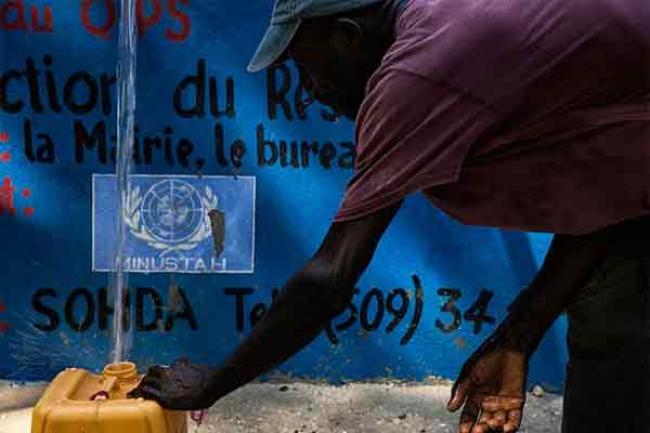Just Earth News 18 Jan 2017, 05:55 am Print

Logan Abassi/MINUSTAH
Dr. David Nabarro, the UN Special Adviser to the Secretary-General, will on Wednesday take this message to the World Economic Forum in Davos, Switzerland, where he aims to secure support from donor countries, development banks and the private sector for Haiti's long-term recovery.
“I want to see if it's possible to get that support in the form of a consortium, making certain that Haitians are in charge […] but ensuring there is backup,” he told UN News in an interview, adding that donors want to be sure that “we are going to stick with this and make certain that the strategy is pursued to the finish.”
“I will be responsible for making certain that we do everything we possibly can on this,” said Dr. Nabarro.
Haiti has been dealing with a cholera outbreak since October 2010, some nine months after it suffered a devastating earthquake. The outbreak has affected an estimated 788,000 people and claimed the lives of more than 9,000. Concerted national and international efforts, backed by the United Nations, have resulted in a 90 per cent reduction in the number of suspected cases.
The UN apologized to the people of Haiti last month for the loss of life and suffering caused, and the Special Adviser said he is “committed to a new and enhanced approach on cholera in Haiti.”
The new approach to tackling the disease centres on two different elements, known as 'Track One' and 'Track Two.'
'Track One' consists of a greatly intensified and better-resourced effort to respond to and reduce the incidence of cholera, through addressing Haiti's short- and longer-term issues of water, sanitation and health systems and improved access to care and treatment.
'Track Two' of the approach is the development of a package of material assistance and support to those Haitians most directly affected by cholera, centred on the victims and their families and communities. It is expected that it will also involve affected individuals and communities in the development of the package.
Dr. Nabarro praised donations already made by France and Republic of Korea to the anti-cholera effort, which have pledged $636,000 and $1 million respectively to UN funds. Canada has also recently pledged $4.6 million.
- Coffee and tea: This everyday drink may help protect your brain from dementia
- Happy Chocolate Day! The sweet secret behind chocolate’s hidden benefits
- Cambridge study finds menopause affects memory, mood, and sleep
- Nipah horror returns: WHO confirms death of a woman in Bangladesh
- Falling birth rates blamed on COVID shots? New research says think again





-1763561110.jpg)
